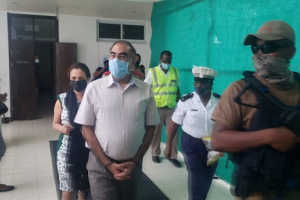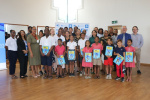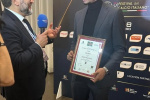Hilton properties in Seychelles striving for sustainability by engaging with local communities

Labriz Silhouette grows about 20 percent of its vegetables and uses filtered water put in glass bottles to be used in the rooms and Café Dauban. (Seychelles Nation)
(Seychelles News Agency) - The three Hilton properties in Seychelles -- Hilton Seychelles Labriz, Hilton Northolme and Hilton Double Tree -- are striving for sustainability by engaging with the local communities in this process.
The resorts recently organised several activities to showcase the different projects to secondary school students and partners. The main activities were held at the Hilton Seychelles Labriz on the island of Silhouette located 20 km northwest of Mahe, the main island, and accessible by boat and helicopter.
Visitors to the island learned more about the hotel’s ventures to make the hotel plastic-free, reduce waste by sorting out waste and recycling, composting as well as developing their organic garden.
Hilton Seychelles Labriz has recently implemented an aquaponics project and the resort is also actively involved in the islands’ conservation projects.
The different projects show that the company has a “positive environmental and social impact on every community in which it operates,” said the minister for tourism, Didier Dogley, who was present for the activities.
 |
| Visitors to Labriz Silhouette get the chance to learn more about the various sustainable projects of the hotel. (Seychelles Nation) Photo License: CC-BY |
“It is good that the hotel believes in sustaining the islands for the future generation. Sustainability is good for business and it is positive to grow the economy,” said Dogley.
Silhouette, the third largest island of the Seychelles’ archipelago in the western Indian Ocean, is home to the critically endangered sheath-tailed bat. Resort general manager Andre Borg said that “they are highly engaged in protecting the species.”
Hilton Seychelles Labriz has made significant efforts to remove plastic completely from the island with the introduction of steel water bottles which guests can refill. The hotel is also pesticide-free and it limits food wastage whereby the organic waste is used as compost.
The resort uses aquaponics to grow about 20 percent of its vegetables. The remaining 80 percent of their produce is supplied by local farmers from Mahe.
Aquaponics is a combination of aquaculture, which is growing fish and other aquatic animals, and hydroponics which is growing plants without soil. Aquaponics uses these two in a symbiotic combination in which plants are fed the aquatic animals’ discharge or waste. In return, the vegetables clean the water that goes back to the fish.
The hotel also collects leftover soaps and donates same to the orphanage - President’s Village. This project is called ‘soap for hope’.
As a long-term project, Hilton Seychelles Labriz hopes to transform the Silhouette primary school that is now unoccupied into an educational centre for students from the University of Seychelles.
The second part of the activities was held at the Seychelles Hilton Northolme in the northern district of Glacis on Mahe, where a visit of the coral nursery project was planned. The conservation project is helping to protect and preserve the marine and reef life along the island’s north-west coast.
 |
| A 650-metre snorkelling trail has been created by Hilton’s Marine Conservation Society Seychelles team as part of the Northolme's conservation project. (Seychelles Nation) Photo License: CC-BY |
The students who wanted to see for themselves the positive impact of the conservation project were able to enjoy a 650-metre snorkelling trail created by Hilton’s Marine Conservation Society Seychelles (MSCC) team. The trail takes guests to five different buoys, each of which highlights the beauty of the reef.
“With a vast Exclusive Economic Zone of 1.37 million square kilometres, many of the inhabitants of Seychelles look to the sea for sustenance. With the importance of its surrounding waters, Seychelles is putting a lot of emphasis on the conservation of its marine resources,” said Daniele Fabbri the hotel's general manager.
“Hilton is one of the biggest hotel companies in the world. Imagine if Hilton can make changes in the way it uses energy, the way it recycles food or the way it removes plastic, what impact Hilton can have in the world environment? This is actually the step that Hilton is taking because we do recognise the power that we have to really make a change,” says Fabbri.
|
|
| The first on-land coral nursery project on the Hilton DoubleTree Resort launched by a conservation group from Anse Forbans. (Lisa Booyse, Anse Forbans Community Conservation Programme) Photo License: CC-BY |
Earlier this year, Hilton DoubleTree partnered with a conservation group from Anse Forbans in the south of the main island and launched the first on-land coral nursery project. The main aim of the project is to educate the community and act as a backup plan in case of a major seawater warming effect in the island nation.






